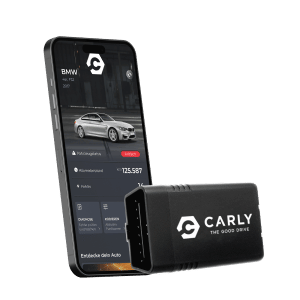When your car’s check engine light comes on, it can be alarming. It’s a warning sign that something’s wrong with your vehicle, but it doesn’t tell you what’s specifically causing the issue. This is where a check engine light reader comes in handy. It’s a tool that can help you diagnose the problem, giving you an idea of what needs fixing before you head to the mechanic.
In this article, we’ll discuss everything you need to know about the check engine light reader, including its benefits, how to use it, and what to do when the light shows up.
GAIN MORE CONTROL OF YOUR CAR WITH THE CARLY FEATURES
Check the exact pricing of Carly for your car brand!

Fast International Shipping with DHL

14 days adaptor return policy

Excellent customer support

Lifetime warranty in the hardware
SEEN IN

Table of Contents
How Does the Check Engine Light Reader Work?
The check engine light reader is a small electronic device that connects to your car’s computer system. It reads the error codes stored in the computer and translates them into a language that you can understand. The codes provide information about the specific problem that your car is experiencing, allowing you to make an informed decision about what to do next.
Benefits of Using a Check Engine Light Reader
Using a check engine light reader offers several benefits, including:
- Saving Money: A check engine light reader can help you identify the issue before it becomes more severe, saving you money on costly repairs.
- Time-Saving: By identifying the issue before taking your car to the mechanic, you can save time in diagnosing the problem.
- Easy to Use: Check engine light readers are user-friendly and can be used by anyone with basic car knowledge.
- Peace of Mind: Knowing what the issue is before taking your car to the mechanic can give you peace of mind.
How to Use a Check Engine Light Reader
Using a check engine light reader is a straightforward process. Here’s how to do it:
- Locate the OBD-II port in your car. It’s usually located near the steering wheel.
- Plug the check engine light reader into the port.
- Turn on the ignition, but don’t start the engine.
- Follow the instructions on the reader’s screen to read the error codes.
- Look up the codes online or in the manual that comes with the reader to identify the problem.
Common Causes of a Check Engine Light
Several issues can cause the check engine light to come on. Some of the most common causes include:
- Faulty Oxygen Sensor
- Loose or Damaged Gas Cap
- Malfunctioning Catalytic Converter
- Worn Spark Plugs or Wires
- Dead Battery or Alternator
What to Do When Your Check Engine Light Comes On
If your check engine light comes on, don’t panic. Here’s what you should do:
- Check your gas cap: Ensure that the gas cap is tightly secured. A loose or damaged gas cap can cause the light to come on.
- Use a check engine light reader: Connect a check engine light reader to your car’s computer system to read the error codes.
- Look up the codes online or in the manual that comes with the reader to identify the problem.
- Take your car to the mechanic: Once you’ve identified the issue, take your car to a trusted mechanic to have it fixed.
How to Reset Check Engine Light with Code Reader
- Connect the code reader to the OBD-II port under the dashboard of your vehicle.
- Turn on the ignition but do not start the engine.
- Follow the instructions provided with the code reader to access the “Clear Codes” or “Erase Codes” function.
- Select this function to clear the diagnostic trouble codes that triggered the check engine light.
- Wait for the code reader to confirm that the codes have been cleared.
- Turn off the ignition and disconnect the code reader from the OBD-II port.
- Start the engine and check that the check engine light is no longer illuminated.
Note that resetting the check engine light does not fix the underlying issue that triggered it. If the light comes back on after resetting it, you should have your vehicle diagnosed and repaired by a qualified mechanic.
FAQ
Can a check engine light reader be used on any car?
Check engine light readers can be used on most cars made after 1996.
How often should I use a check engine light reader?
You should only use a check engine light reader when the check engine light comes on. However, it’s a good idea to keep one handy in case the light does come on.
Can I use a check engine light reader to turn off the check engine light?
Yes, some check engine light readers allow you to reset the check engine light. However, it’s important to note that resetting the light doesn’t fix the problem that caused it to come on in the first place.
Conclusion
The check engine light reader is a useful tool that can help you diagnose issues with your car. By identifying the issue before taking your car to the mechanic, you can save time and money on repairs. Remember to use a check engine light reader whenever the light comes on, and take your car to a trusted mechanic to have it fixed. With the information provided in this article, you’ll be able to confidently use a check engine light reader and take the necessary steps to keep your car running smoothly.

